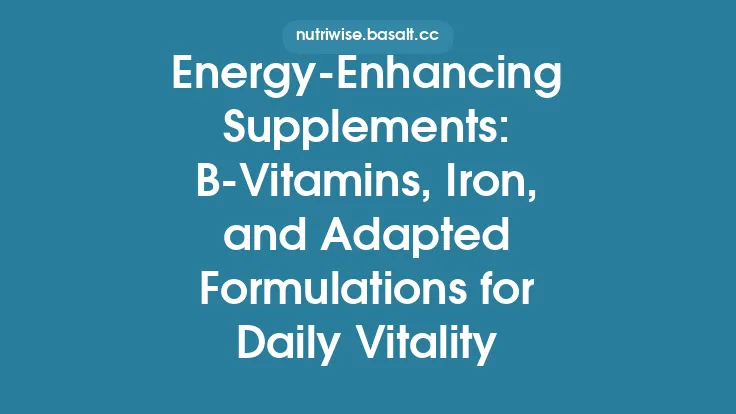Travel often throws our bodies into a whirlwind of new environments, irregular schedules, and unexpected stressors. From navigating crowded airports to adjusting to unfamiliar time zones, the modern traveler faces challenges that can tax both the immune system and energy reserves. While a balanced diet and adequate rest remain foundational, strategic supplementation can provide an extra layer of protection and vitality, helping you stay healthy, alert, and ready to explore. Below is a comprehensive guide to selecting, packing, and using travel‑ready supplements that support immunity and energy without relying on one‑size‑fits‑all recommendations.
Why Travel Demands Specific Supplement Strategies
- Immune Exposure
Airports, planes, and public transportation are hotbeds for airborne pathogens. Close proximity to other travelers, recycled cabin air, and frequent hand‑to‑face contact increase the likelihood of encountering viruses and bacteria.
- Circadian Disruption
Crossing time zones resets the body’s internal clock, leading to jet lag, hormonal imbalances, and reduced metabolic efficiency. This can manifest as fatigue, mood swings, and impaired cognitive function.
- Nutrient Gaps
On the road, meals are often irregular, high in processed carbs, and low in fresh produce. This can result in short‑term deficiencies of vitamins, minerals, and phytonutrients essential for immune competence and energy metabolism.
- Dehydration and Electrolyte Loss
Cabin air is typically low in humidity, accelerating fluid loss. Dehydration impairs immune cell function and reduces physical performance, while electrolyte imbalances can cause muscle cramps and dizziness.
- Stress and Physical Strain
Carrying luggage, navigating unfamiliar streets, and dealing with travel logistics trigger the sympathetic nervous system, increasing cortisol levels and depleting energy stores.
Understanding these stressors helps pinpoint which nutrients and botanicals can most effectively counteract the travel‑induced challenges.
Core Immune‑Supporting Supplements for Travelers
| Supplement | Primary Action | Typical Dose for Adults | Key Considerations |
|---|---|---|---|
| Vitamin C (ascorbic acid) | Antioxidant, supports leukocyte function, enhances skin barrier | 500–1000 mg 2–3×/day | Split doses to improve absorption; buffered forms (e.g., calcium ascorbate) reduce GI upset. |
| Vitamin D3 | Modulates innate immunity, promotes antimicrobial peptide production | 1000–2000 IU daily (higher if deficient) | Sun exposure may be limited; check baseline levels if possible. |
| Zinc (picolinate or citrate) | Inhibits viral replication, stabilizes cell membranes | 15–30 mg daily (max 40 mg) | Avoid high doses >40 mg for >2 weeks to prevent copper depletion. |
| Elderberry extract (standardized to anthocyanins) | Antiviral activity, reduces symptom severity | 300–600 mg 2×/day | Choose products with ≥30 % anthocyanins; avoid if on immunosuppressants. |
| Echinacea purpurea (standardized to phenolics) | Stimulates phagocytosis, may shorten cold duration | 300 mg 3×/day (short‑term, ≤2 weeks) | Not recommended for autoimmune conditions; discontinue if symptoms worsen. |
| Selenium (as selenomethionine) | Supports glutathione peroxidase, reduces oxidative stress | 55–100 µg daily | Upper limit 400 µg; excess can be toxic. |
How to Use:
- Pre‑Travel Loading: Begin immune‑support regimen 7–10 days before departure to build up tissue stores, especially for vitamin C and zinc.
- During Travel: Maintain daily dosing; consider a “travel pack” of single‑serve sachets for convenience.
- Post‑Travel: Continue for 3–5 days after returning to aid recovery from any subclinical infections.
Energy‑Boosting Options for On‑the‑Go Performance
| Supplement | Mechanism | Typical Dose | Timing Tips |
|---|---|---|---|
| B‑Complex (B1, B2, B3, B5, B6, B7, B9, B12) | Cofactors in carbohydrate, fat, and protein metabolism; supports mitochondrial function | 1–2 tablets (providing ~100 % DV each) | Take with breakfast to fuel the day’s activities. |
| Coenzyme Q10 (Ubiquinol) | Electron carrier in the electron transport chain; improves ATP production | 100–200 mg daily | Best absorbed with a fat‑containing meal. |
| L‑Carnitine (tartrate) | Transports long‑chain fatty acids into mitochondria for oxidation | 500–1000 mg 1–2×/day | Take before physical exertion (e.g., hiking, walking tours). |
| Caffeine + L‑Theanine (ratio 1:2) | Caffeine stimulates CNS; L‑theanine smooths jitteriness, improves focus | 100 mg caffeine + 200 mg L‑theanine | Use early in the day; avoid late‑afternoon to prevent sleep disruption. |
| Rhodiola rosea (standardized to rosavins & salidroside) | Adaptogen that reduces perceived fatigue, enhances oxygen utilization | 200–400 mg 1×/day | Take in the morning; avoid within 4 h of bedtime. |
Practical Note: Energy supplements should complement, not replace, adequate sleep and nutrition. Overreliance on stimulants can exacerbate jet lag and increase cortisol.
Probiotics and Gut Health While Traveling
A healthy gut microbiome is a cornerstone of immune resilience and nutrient absorption. Travel can disturb gut flora through changes in diet, stress, and exposure to unfamiliar microbes.
- Strain Selection: Look for multi‑strain formulas containing *Lactobacillus rhamnosus GG, Bifidobacterium lactis, and Saccharomyces boulardii*. These have documented benefits for preventing travel‑associated diarrhea.
- Dosage: 10–20 billion CFU daily, taken with a meal to protect against gastric acid.
- Shelf‑Stability: Choose freeze‑dry or shelf‑stable capsules that do not require refrigeration—ideal for luggage.
- Prebiotic Support: Adding a small dose of inulin or partially hydrolyzed guar gum (2–5 g) can feed beneficial bacteria, especially when fiber intake is low.
Implementation: Start probiotic supplementation 3–5 days before departure and continue throughout the trip. If you experience gastrointestinal upset, consider a short course of a probiotic with *S. boulardii* (5–10 billion CFU) to restore balance.
Adaptogens for Stress and Jet Lag
Adaptogenic botanicals help the body modulate stress responses, supporting both immune function and energy homeostasis.
| Adaptogen | Primary Benefits | Typical Dose | Usage Guidance |
|---|---|---|---|
| Ashwagandha (Withania somnifera, root extract) | Lowers cortisol, improves sleep quality, supports cellular immunity | 300–600 mg of a 5 % withanolide extract | Take in the evening; may aid sleep after long flights. |
| Schisandra chinensis (berry extract) | Enhances hepatic detox, improves endurance, balances circadian rhythm | 500 mg 1–2×/day | Split dosing; avoid high doses late at night. |
| Holy Basil (Ocimum sanctum) | Antioxidant, anti‑inflammatory, supports respiratory health | 300–500 mg 1–2×/day | Can be taken with meals; useful for high‑stress itineraries. |
Safety Tip: While generally well‑tolerated, adaptogens may interact with thyroid medication or sedatives. Consult a healthcare professional if you are on prescription drugs.
Electrolyte Balance and Hydration
Dehydration is a silent performance killer. Maintaining electrolyte homeostasis ensures optimal nerve transmission, muscle function, and immune cell activity.
- Sodium & Potassium: A balanced oral rehydration solution (ORS) containing 90 mEq/L sodium and 20 mEq/L potassium is ideal for long flights and hot climates.
- Magnesium (citrate or glycinate): 200–300 mg daily supports muscle relaxation and energy production.
- Trace Minerals: Small amounts of calcium, chloride, and bicarbonate help fine‑tune fluid balance.
Practical Formulations:
- Powdered ORS sachets (e.g., WHO‑type formulas) are lightweight and can be mixed with water on demand.
- Electrolyte tablets (containing sodium, potassium, magnesium, and calcium) are convenient for quick dosing.
Hydration Strategy:
- Pre‑flight: Drink 500 ml of water 30 min before boarding.
- In‑flight: Sip 150–200 ml every 30 min; add an electrolyte tablet to each 500 ml water bottle.
- Post‑flight: Rehydrate with a full ORS dose within the first hour of landing.
Practical Tips for Packing and Using Supplements on the Road
- Travel‑Size Packaging
- Transfer pills into labeled, resealable blister packs or pill organizers (e.g., 7‑day or 14‑day compartments).
- Use vacuum‑sealed bags for powders to protect against moisture.
- Regulatory Compliance
- Most countries allow personal quantities of vitamins and minerals, but some botanicals (e.g., certain adaptogens) may be restricted. Check the destination’s customs guidelines.
- Keep original product labels and a printed list of ingredients in case security asks for verification.
- Temperature Stability
- Avoid heat‑sensitive supplements (e.g., certain probiotics) in checked luggage; store them in a insulated pouch with a small ice pack if traveling to hot climates.
- Most vitamins, minerals, and adaptogens are stable at room temperature for 1–2 years.
- Timing with Meals
- Fat‑soluble vitamins (A, D, E, K) and CoQ10 should be taken with a source of dietary fat.
- Iron and zinc are best absorbed on an empty stomach but can cause GI upset; if needed, take with a small snack.
- Backup Plan
- Carry a small “emergency kit” with a multivitamin, electrolyte tablets, and a probiotic capsule in your carry‑on. This ensures you have essential support even if luggage is delayed.
Safety, Interactions, and Regulatory Considerations
- Medical History Review
Prior to initiating any supplement regimen, assess personal health conditions (e.g., autoimmune disorders, clotting disorders) and current medications.
- Potential Interactions
- Vitamin K can interfere with anticoagulant therapy (e.g., warfarin).
- Zinc at high doses may reduce absorption of certain antibiotics (e.g., quinolones).
- Adaptogens such as ashwagandha may potentiate sedative effects of antihistamines or benzodiazepines.
- Upper Intake Levels
Adhere to established tolerable upper intake levels (ULs) to avoid toxicity, especially for fat‑soluble vitamins and minerals like iron and selenium.
- Quality Assurance
Choose third‑party tested products (e.g., USP, NSF, ConsumerLab) to ensure label accuracy, absence of contaminants, and consistent potency.
- Travel Insurance
Some policies cover adverse events related to supplement misuse; keep receipts and documentation for any health‑related claims.
Creating a Personalized Travel Supplement Kit
- Baseline Assessment
- Conduct a quick nutrient status check (e.g., vitamin D, iron) if possible before departure.
- Identify personal stressors (e.g., frequent long‑haul flights, high‑altitude destinations) to prioritize specific supplements.
- Core Kit (Daily Essentials)
- Multivitamin (broad spectrum, with vitamin D3)
- Vitamin C (500 mg)
- Zinc (15 mg)
- B‑Complex
- Electrolyte tablet
- Probiotic capsule
- Situational Add‑Ons
- Elderberry or Echinacea for flu season or high‑risk exposure periods.
- Adaptogen (ashwagandha or rhodiola) for high‑stress itineraries.
- CoQ10 for physically demanding trips (e.g., trekking).
- Caffeine + L‑theanine for early‑morning flights or jet‑lag recovery.
- Packaging Blueprint
- Day‑by‑day blister packs for pills (e.g., 30‑day supply).
- Sachet bags for powders (vitamin C, electrolytes).
- Mini‑bottles for liquid extracts (elderberry, adaptogen tinctures).
- Final Checklist Before Boarding
- All supplements in original or clearly labeled containers.
- Documentation of ingredients and dosage.
- Portable water bottle and a small scoop for powders.
- Backup supply in carry‑on in case checked luggage is delayed.
By integrating these evidence‑based supplements into a well‑planned travel routine, you can fortify your immune defenses, sustain steady energy levels, and navigate the inevitable disruptions of travel with greater resilience. Remember that supplements are a complement—not a substitute—for sound nutrition, adequate sleep, and regular movement. With a thoughtful, personalized kit in hand, you’ll be better equipped to turn every journey into a healthy, enjoyable adventure.





